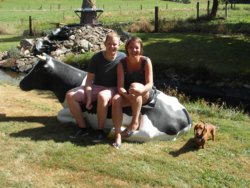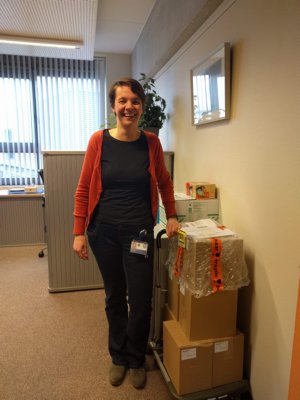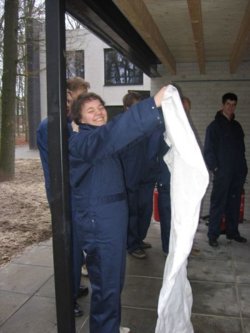Mathematical calculations save lives
Interview with Giske Lagerweij by Diana Dalenoord
 After obtaining her Bachelor's degree in Applied Mathematics, Giske Lagerweij decided to take up the Master's programme in Applied Mathematics to become an expert in solving societal challenges from technology to healthcare. For two years, she is a scientific researcher at the National Institute for Public Health and the Environment (RIVM) and is involved in conducting research and making calculations on the burden of infectious diseases.
After obtaining her Bachelor's degree in Applied Mathematics, Giske Lagerweij decided to take up the Master's programme in Applied Mathematics to become an expert in solving societal challenges from technology to healthcare. For two years, she is a scientific researcher at the National Institute for Public Health and the Environment (RIVM) and is involved in conducting research and making calculations on the burden of infectious diseases.
Why pursue a Master's degree in Applied Mathematics at UT?
I chose to do a Master's programme in Applied Mathematics mainly because the lecturers and professors saw merit in my desire to do something medical. I didn't want to make timetables for a hospital, I wanted to go into a hospital and do something cool with my maths. I was allowed to take electives at BMT and TG, and I wrote to hospitals, the Roessingh and companies for an internship assignment.
A medical internship
During my internship at the Department of Nuclear Medicine of the Medisch Spectrum Twente in Enschede, I mainly worked on PET scans (positron emission tomography). A patient is injected with a radioactive substance, this substance decays and the degree of decay is measured. The degree of decay is converted into images, and with these images, doctors can determine the location and size of (abnormal) tissue. In this way, patients can be treated better, because the location of the tumour, for example, is properly determined and the surrounding tissue is not irradiated. I focused on tumour tissue. However, the conversion of decay into images is not always very reliable; there is a lot of noise on the line. My assignment was to find out whether you can determine which pixel in an image is "noise" and which pixel is (possibly) a tumour.
I think the broad knowledge you gain from studying applied mathematics helped me enormously. The assignment was applied, but because of the broad insight you gain during the study, you start looking in a direction for the solution (and sometimes this direction is wrong and you have to change your plans after three months). As a mathematician, you have a wide range of knowledge, usually not in detail, but approximately, after which you can go into depth at a later stage by specialising."
Interest in mathematics and the medical world
After graduation, I knew I wanted to continue in healthcare. I have been interested in technical and medical matters since secondary school. Before I went to study at UT, I was in doubt between mathematics and medicine (technical). Medicine was soon dropped, and then I had to choose between Applied Mathematics and Technical Medicine. There is mathematics everywhere, so I knew that somewhere along the way I would be able to fulfil my wish to study a programme that offered a combination of mathematics and something medical. In the end, I decided on the bachelor's and later the master's programme in Applied Mathematics."
PhD research on the epidemiology
 I ended up in Utrecht via a small diversion - I used to work for a software company in Deventer. Although I always said that I absolutely did not want to do a PhD, I changed my mind after two years of working in the business world. I found out that a PhD position would not be such a bad plan. I wanted more depth and I missed the link with mathematical applications in the medical field. Nothing is as changeable as the human being, right?
I ended up in Utrecht via a small diversion - I used to work for a software company in Deventer. Although I always said that I absolutely did not want to do a PhD, I changed my mind after two years of working in the business world. I found out that a PhD position would not be such a bad plan. I wanted more depth and I missed the link with mathematical applications in the medical field. Nothing is as changeable as the human being, right?
The choice for Utrecht was a coincidence, they offered a nice PhD assignment where they were looking for someone with a maths/economics background. I was on the edge of epidemiology, the really technical maths side. During my PhD, I also completed the full master's programme in Epidemiology. This master's opens doors for researchers without a medical background to still be able to take on medical issues.
With my mathematical background, during my PhD, I focused on the (economic) evaluation of preventive interventions for cardiovascular diseases. This meant analysing prediction models, writing (time-consuming) scripts, converting problems into applied solutions, and thinking logically about ‘how should I approach this problem?’ And what knowledge can I use from my master's degree to tackle this problem?
A job at the National Institute for Public Health and the Environment (RIVM)
My work involves calculating the burden of infectious diseases. This includes all kinds of infectious diseases such as HIV, influenza (flu), but also food-related infectious diseases such as salmonella, norovirus (stomach flu) and toxoplasmosis. In total, we calculate the burden of disease for some 41 infectious diseases. The burden of disease is a term used to express the number of human lives lost, through disability and/or premature death, for a particular (infectious) disease. In addition, I also work on mathematical models for other purposes, such as predicting infections or calculating the costs and benefits of interventions to prevent/reduce infectious diseases.
And in case you are wondering, am I also working on COVID19? Yes, I also work on COVID-19-related issues, both calculating the burden of COVID-19 and making mathematical models.
RIVM is the right employer for me
I think all domains have a lot to do with mathematics, there is a lot of calculation within the domains. I work within the domain of infectious diseases & vaccinology, but there are at least as many mathematical models or mathematics applied within the other domains (Public Health & Care and Environment & Safety). After all, mathematics is in everything, whether it is modelling the spread of (infectious) diseases, calculating costs and benefits or a lot of statistics when analysing patient research, on which many epidemiologists work.
Naturally, I use the knowledge from my mathematical past in the performance of my work. Coincidentally, I recently applied basic calculus, because I was looking for a term in such a way that my (probability distribution) function actually became a probability distribution function. All integral and differentiation rules were used again. There are no specific subjects that I apply or use extensively in my work at the moment, it is mainly the combination of subjects and the experience of bringing together the knowledge from various subjects. It is really the total package that I use, the analytical ability to see connections, ask good questions and think logically. Combining linear algebra, scientific computing, statistics and probability, calculus and programming into one.
Every year, a number of reports are published on the occurrence of infectious diseases in the Netherlands. These reports present the burden of disease. I am involved in conducting research, which can sometimes serve as the basis for advice. My contribution is mainly in picking up tasks quickly, and because as a mathematician, you develop an overview that enables you to quickly see what you have to do, what happens in some cases, how things fit together and in which direction you can find the solution.
Recommending study seekers pick up a master's degree in Applied Mathematics
 I would tip study seekers absolutely to think about a master’s in Applied Mathematics. I remember my student life as a good time. Especially the (special) lectures of certain teachers, the solidarity between students and sometimes also teachers, the friendly atmosphere of the UT, the nice study association Abacus, the doors of teachers that were open, etc.
I would tip study seekers absolutely to think about a master’s in Applied Mathematics. I remember my student life as a good time. Especially the (special) lectures of certain teachers, the solidarity between students and sometimes also teachers, the friendly atmosphere of the UT, the nice study association Abacus, the doors of teachers that were open, etc.
I said before that mathematics can be used everywhere! You are an indispensable link in society, you can use and apply your knowledge everywhere. It is difficult to explain to third parties what an (applied) mathematician can do exactly. Besides the enthusiasm, you need (a lot of) perseverance, but in the end, it's true: nobody can do without mathematics and therefore not without mathematicians either! In your work environment, it won't happen often that you collaborate with several mathematicians who have studied the same as you. You are often an exception within the group, but that also makes it very special. You can easily adapt and empathise with others making you a valued colleague within the group.
